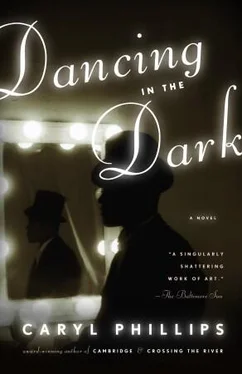Bert sleeps next to his grateful wife. In the morning Mother brings an orange to the bed, and then the newspaper. She asks whether he thinks she ought to visit with Aida, but he assures her that Aida will be fine. George is attending to her. Mother’s mouth falls open, for she cannot disguise her surprise, but she says nothing. He opens the newspaper, but as soon as his wife leaves the room he rests it down.
Having eaten the orange, he climbs from the bed, gets dressed, and walks the few blocks through the soot-blackened snow down to George and Aida’s place, where he finds his partner sitting alone and smoking a cigar. George greets him warmly and then announces that he must soon leave for he has to go back to the hospital and visit his wife. He stutters as he reminds Bert what a fine dancer Aida is, and how she is the real star of the company. He asks Bert what he thinks of her number “I’ll Keep a Warm Spot in My Heart for You,” telling him that it was undoubtedly the high point in Abyssinia and that maybe in the future they ought to feature Aida and her dancers more prominently. Didn’t she put the dance numbers together better than anything in a Cole and Johnson show, better than anything Hogan had ever done? “Menelik’s Tribute to Queen Tai Ta,” “The Dance of the Falasha Maids,” and “The Dance of the Amhara Maids.” Who had ever seen choreography like it? George talks, and Bert listens for George likes to talk. George also likes to be right more than any man he has ever met, but he is not right about Aida. She is not the star of the show, nor does she need to be featured more prominently. Aida simply needs a husband, that is all. If she had a husband, then everything would be all right, and good things might well follow from this. But Aida is lying alone in a hospital room while a guilt-burdened George smokes a cigar and talks incessantly to his partner.
George lights another cigar. He stands now and begins to pace back and forth by the window. He insists that their new show, Bandana Land , will be decidedly different, something their public has never seen before. An impatient George stubs out the newly lit cigar, and then he speaks quietly. But let me get this clear, you’re saying that because white folks pay to see us we got to please them, right? Bert nods, for he knows that this is the truth, and although he does not like this fact it nonetheless remains a fact. George takes a seat opposite his partner. George appears to have forgotten that his wife is lying alone in a hospital bed and he is supposed to be visiting with her. But I’m tired of pleasing white folks, Bert. I’m tired and beat. There is a strange lisp to George’s tongue. Bert, a man can kill himself trying to please white folks.
— Your wife getting strong again, honey? I hear she’s the star of the new show?
— I don’t know about star.
— You getting good early notices, George?
— From you?
— You better save your strength with all that talking if you’re looking for good notices from me.
— I hear Jimmie’s soon going to close down the hotel.
— Well, Eva’ll find some other place for us to play. This ain’t the only joint in town.
— I guess not.
— What’s the matter, you don’t want to play no more, is that it? You feeling guilty, George?
— I ain’t feeling no guilt.
— Well don’t you think you should?
— Whose side are you on here?
— You better change that tone, Mr. High and Mighty George
Walker. That ain’t no way to treat a lady, now is it? Well, is it?
— Eva.
— I can hear you. You fixing to end things between us, George? After all this time?
— Eva, she’s not doing so well.
— Now, that’s not what I asked you, George Walker. If Jimmie closes down the hotel it just means that we don’t have a roost at this flophouse, but there’s plenty of other places. Damn, we can even buy a place, now wouldn’t that be swell? A furnished place, maybe up in Harlem …
— No.
— No? George, you better get whatever it is that’s on your mind out into the open before I lose my patience with you. What’s the matter with you? You listening to me, George Walker?
Gentlemen of the Thirteen Club — I have seen in the daily press an announcement of a dinner to take place at the Harlem Casino Café this evening the 13th of February, 1908, [at] which time representatives of the Hebrew race, the Japanese race, the Italian race, and the Irish race will speak on the subject, “Is Race Prejudice a Form of Superstition?” Gentlemen, please explain how it came to pass that your learned society failed to invite a representative of my race to speak at your dinner. Is it possible that you have members who are seeking to emancipate themselves from superstition and yet they fail to be broad[-minded] enough to ask a man of African blood in his veins to be present and to take part in your deliberations? … Gentlemen, please do not misunderstand me in the least. I am not a race agitator, and do not claim to thoroughly understand the questions with which your society deals. Williams and Walker seek to make people happy by giving them a clean-cut show, composed of and acted entirely by members of the African race.
GEORGE WALKER
She talks endlessly, but her tirade is really a series of suggestions and complaints loosely strung together and punctuated with gestures, some decent, the remainder an unsubtle appeal to his baser instincts. She insists that men have tried to use her before, but they have failed for she is “hotter than Tabasco.” She laughs out loud, but George starts in and explains to her that these things run their course, and he can’t live with the thought of bringing disgrace on his race should anything happen to Aida, but Eva isn’t prepared to listen. She stomps around the room, tossing back her head like a petulant pony, running her hands through her untamed hair, and spitting out her foul words and kicking the furniture. By the time she finally decides to leave he has long stopped listening to her. The slamming of the door shakes the whole room and only serves to remind him of why they call her “the cyclone.” He goes to the window and discreetly pulls the drape to one side so that he can look down onto Fifty-third Street, where a clearly distressed Eva is walking slowly and with her head lowered. As he gazes down at her he is surprised to feel tears pooling behind his eyes.
Lottie opens the door and informs George that her husband is at Metheney’s Bar. George tips his hat and graciously thanks his friend’s visibly aging wife, but decides that he won’t disturb Bert. There will be time enough to set things straight with his partner tomorrow. He would want to know. Not that he would ever ask, but he feels obliged to tell Bert that this particular chapter has come to an end.
Eva took out a full-page advertisement in all the theatrical newspapers making it clear that if anybody had the temerity to accuse her of having had relations with a well-known, but unnamed, colored performer, then she would sue. She claimed that she was aware of certain unpleasant rumors that were circulating regarding her personal behavior, but she urged her fans to use their intelligence in distinguishing between her stage persona and the Christian moral strictures within which she lived her daily life. She pointed out that she was a happily married woman, and such slander besmirched not only her personal and professional reputation, but that of her loving spouse. The advertisement was featured prominently, as were the news reports that picked up on its appearance. In response she received only favorable notices, all of which praised her courage in distancing herself from such abominable talk. As a result she was received with renewed affection and the “I Don’t Care Girl” enjoyed a sudden upsurge of popularity.
Читать дальше












